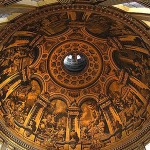Evening in the Palace of Reason
On the evening of May 7, 1747, Frederick the Great issued a very focused challenge to an aging J.S. Bach: improvise, on the spot, a three-part fugue based on a 21-note theme that was written specifically to make the task all but impossible.
James R. Gaines uses this famous historical challenge not simply to tell the stories of these two historical giants, but also to frame the broader cultural tensions they each represented: reason vs. faith; materialism vs. belief; the cold
rationality of the Enlightenment vs. a deep and abiding trust in a loving God.
By making Frederick’s challenge the book’s focal point, Gaines is able to provide a wonderful introduction to some of the cultural forces that led to the Enlightenment, and serves the reader up with an engaging and interesting
overview of the lives of both the composer and the king of Prussia.
As much as anything, though, the book reinforced for this reader not only Bach’s unalloyed genius, but also his ability to create—prolifically—in the face of the griefs, challenges and difficulties of everyday life.
Three quick examples make the point: 1. he buried 12 of his 20 children; 2. In Leipzig, he lived with more than a dozen people in an 800-square-foot apartment with a single (unheated) bathroom; 3. the first performance of his “St. Matthew Passion”— “perhaps the greatest oratorio and one of the most ambitious and powerful works of music ever written”—was so unappreciated during his lifetime that, following its premiere, Bach’s supervisors actually docked his pay, proof, as Gaines understates it, “of their shortsightedness.”
This is a tremendous book about an important moment in our cultural history—and a wonderful introduction to one of the world’s monumental, towering geniuses. Highly recommended.














No comments